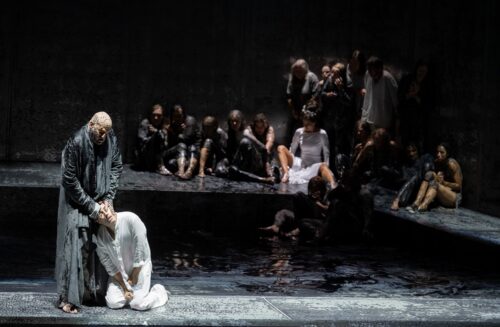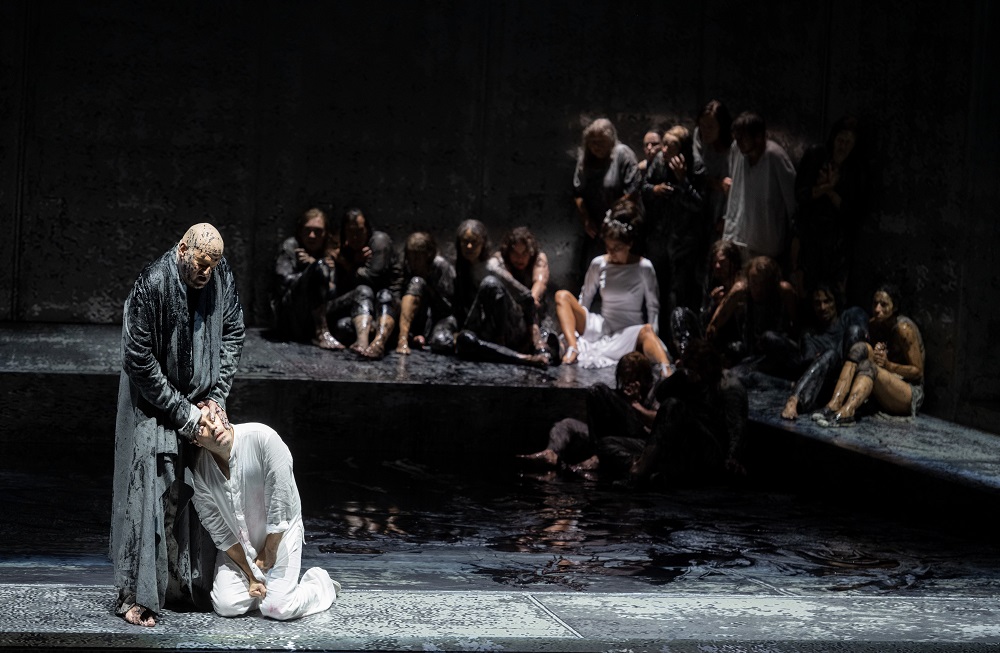 Germany Enescu, Œdipe: Soloists, Choir of the Komische Oper Berlin, Vocalconsort Berlin (chorus director: David Cavelius), Children’s Choir of the Komische Oper Berlin (chorus director: Dagmar Fiebach), Orchestra of the Komische Oper Berlin, Ainārs Rubikis (conductor). Komische Oper, Berlin, 29.8.2021. (MB)
Germany Enescu, Œdipe: Soloists, Choir of the Komische Oper Berlin, Vocalconsort Berlin (chorus director: David Cavelius), Children’s Choir of the Komische Oper Berlin (chorus director: Dagmar Fiebach), Orchestra of the Komische Oper Berlin, Ainārs Rubikis (conductor). Komische Oper, Berlin, 29.8.2021. (MB)

Production:
Director – Evgeny Titov
Set designs – Rufus Didwiszus, Charlotte Spichalsky
Costumes – Eva Dessecker
Dramaturgy – Ulrich Lenz
Cast:
Œdipe – Leigh Melrose
Tirésias – Jens Larsen
Créon – Joachum Goltz
High Priest – Vazgen Gazaryan
Night Watchman – Shavleg Armasi
Shepherd – Johannes Dunz
Laïos – Christoph Späth
Jocaste – Karolina Gumos
Sphinx – Katarina Bradić
Antigone – Mirka Wagner
Mérope – Susan Zarrabi
Art returns in various ways. There is no one-size-fits-all, nor should there be. In London, the Royal Opera, largely silent during the days of endless lockdown and occasional reprieve, lightened our darkness with a production of La clemenza di Tito about which, if we were brutally honest, we should have been less enthusiastic had it not appeared on the very first day of limited reopening for theatres; it followed that, however, with an outstanding Don Giovanni, showing that nothing, good, bad, or mediocre, should be taken for granted. The Komische Oper took a different path, as indeed have Berlin and Germany. This path, or better this first step, came later but needed no qualification, none whatsoever. Audience numbers are still limited, with a plan for increasing them as the season progresses, but otherwise this was absolutely the real thing. This new production of George Enescu’s Œdipe would have been a fine achievement at any time. Coming as the first full performance and staging, the first time a full orchestra had played in the pit, since the end of February 2020, it was little short of astounding.
A strong sense of company, of music and theatre working together, has always been a hallmark of the Komische Oper and its mission; it dates back to Walter Felsenstein. In the circumstances, one might have expected that to suffer a little, but not at all. Ainārs Rubikis’s musical direction seemed entirely of a piece with Evgeny Titus’s direction of the stage action, as of course did the vocal and dramatic contributions of a fine cast. There were moments of great power — what it was to hear an orchestra of this size once more in the pit, in the theatre! — but also passages of unease, of solace, of somewhere liminal betwixt and between. These were balanced by a keen sense of where the drama was heading and, equally important, ability to communicate that sense in the dynamism that transforms musical structure into form. That would be nothing, of course, without excellence of playing from the Orchestra of the Komische Oper. Together again at last, the players sounded inspired, woodwind modal lyricism (Le tombeau de Couperin came to mind) as crucial to our interpretation of the tragic labyrinth as dread moments of expressionist cataclysm. A cut version of the work, given without an interval, will have had some lamenting what had been lost. As with the performance and staging more broadly, expressionism was favoured, though never exclusively, over classicism. There was, however, much to be gained by seeing and hearing this opera much as it might have been given in the spoken theatre, albeit with a searing intensity that could only come from music, revealing a greater kinship to works such as Salome or Elektra than I had hitherto imagined. Instead of a single day, though, this was a life taken to extremity.
Indeed, the spare, oppressive, in a word fateful set design (Rufus Didwiszus and Charlotte Spichalsky) might almost have been from a staging of Elektra. (Elektra productions, for whatever reason, tend to look strikingly similar.) That frames the action, but so does memory; indeed, inability to escape memory — fate itself, in at least one sense — is depicted and experienced both as frame and framed. Titov has Œdipe visit, witness his birth. Huddled, helpless in foetal position, Œdipe is granted the hopeless gift of understanding and consciously experiencing his fate, incapable of altering it, fully capable of sharing once more in its agony. That fate is not only his, but also the fate of a sick, traumatised society. Theban citizens act as a crowd, a sick crowd at that, from the outset, the plague to come as much an expression of something more fundamental. Titov wisely resists COVID-19 references. We know the day is coming when every third-rate director presents masks, respirators, video conferencing, and so on, but that is not here, not now. That will be a plague of its own. Instead, there is a suggestion that the plague proceeds from Œdipe’s own understanding that there is something wrong with the state of Thebes, appearances of health notwithstanding. That is not to say that it is imagined, but rather that it expresses something wrong, whether that something be social, political, psychological, or all of the above and more. No wonder, ultimately, that Œdipe elects no longer to see. The bloody state of his blindness in wilderness wandering is depicted with tragic horror. It leads to something akin to catharsis; perhaps that is what it is, for the single-mindedness of the dramatic trajectory at play is unquestionable. Blood and water are present at birth and throughout, culminating in cleansing and catharsis. In life and in death, this is elemental drama.
For that single-mindedness permitting of such duality we must also credit Leigh Melrose’s mesmerising performance in the title role. One felt, rather than merely observed, every twist and turn of the fatal screw, words, music, and gesture conceived and delivered in post-Wagnerian whole. Karolina Gumos’s Jocaste was finely sung and possessed of great stage presence; likewise Susan Zarrabi’s Mérope, Œdipe’s disturbing prior model for incestuous attraction. Company stalwart Jens Larsen offered a typically individual, world-weary performance of Tirésias. Shavleg Armasi’s Night Watchman and Katarina Bradić as the Sphinx gave noteworthy portrayals of their characters, words crystal clear and possessed of considerable dramatic import. All the cast worked together to provide something greater than the sum of its parts. So too considerable choral forces heard from above, to hear a combined chorus of that size in itself a treat. This was Berlin’s first new production of Œdipe since 1996, that Deutsche Oper staging last seen in 2004. Let us hope not only that this has a longer life, but that it offers a precedent for other such explorations. Szymanowski’s King Roger for instance, or some Henze. In the meantime, we should be grateful indeed for this.
Mark Berry
